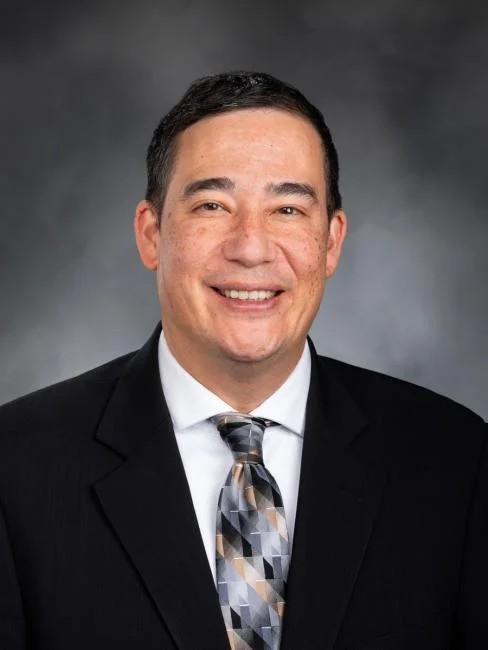Keynote Speakers*
April 15-17, 2025
*Agenda is subject to change
TUESDAY, APRIL 15th

Harnessing the Power of AI for Emergency Management
The use of Artificial Intelligence has the ability to change the face of emergency management. How do we harness it for good and counter it’s use for evil though? This session will cover current AI use in EM and look at what the future may hold.
Sarah K. Miller is a Certified Emergency Manager (CEM) who has worked as an emergency management professional in the Seattle area since 2006. She is currently an Assistant Professor and Department Chair of Emergency Management at Pierce College in Washington. Sarah has worked in public service and public safety for more than 30 years, with a heavy emphasis on technology.
Sarah is active in the International Association of Emergency Managers (IAEM), currently serving as a CEM Commissioner. She is past-President of Region 10 and past-Chair of the Emerging Technology Caucus.
WEDNESDAY, APRIL 16th

Protecting Elections in Times of Crisis: Planning, Response, and Trust
Secretary of State Steve Hobbs provides a behind-the-scenes look at disaster response as Washington’s chief elections official, highlighting the planning and coordination that keep elections secure. He’ll also explore the growing impact of misinformation and disinformation during crises, sharing key lessons and strategies to protect the electoral process and maintain public trust.
Steve Hobbs is Washington’s 16th Secretary of State. He began his tenure in 2021 and was elected by the people of Washington in 2022. He is the first person of color to serve as Secretary of State and only the second in state history who was born in Washington.
Secretary Hobbs leads one of Washington’s most diverse state-government offices, which is responsible for managing state and local elections, corporation and charity filings, the Washington State Library, the Washington Talking Book & Braille Library, and the Washington State Archives. In addition, his office oversees the Combined Fund Drive for charitable giving by state employees, the Productivity Board state employee suggestion incentives program, and the Address Confidentiality Program to help protect survivors of crime.
When Secretary Hobbs assumed office, he prioritized greater election security, countering misleading and harmful election disinformation, and expanded voter education and outreach.
THURSDAY, APRIL 17th
Cybersecurity Infrastructure Security Agency (CISA)
Critical Infrastructure Planning involves the strategic assessment and management of essential systems and assets that support, telecommunications, and public health. CISA proves guidance to support state, local, tribal, and territorial government partners in identify crucial infrastructure needs to maintain the functions Emergency Managers depend on daily. During this presentation, we will provide an overview of CISA’s mission and highlight several of our no-cost tools and resources.
Jana K. Spring serves as a Protective Security Advisor (PSA) for the Department of Homeland Security (DHS), within the Cybersecurity & Infrastructure Security Agency (CISA), the newest federal agency. She’s assigned to the Western Washington District. PSAs are field-deployed personnel who serve as critical infrastructure security specialists who link between federal, state, local, tribal, & territorial governments; private sector owners & operators; and CISA infrastructure protection resources. Jana is a proud Texas native and holds a bachelor’s degree in biology from the University of Houston, Houston, Texas, and is currently a master’s candidate – National Security Studies, American Public University. She is also a graduate of the Naval Postgraduate School-Center for Homeland Defense & Security Emergence Program Monterey, California. A graduate of the Joint U.S. Dept. of Homeland Security – Dept. Of Justice (DHS-DOJ) Intermediate Intelligence Fusion Center Analyst Program, her graduate presentation was subsequently published – “Pipeline Attacks-Indications and Warnings” ▪ IFCAT Magazine, Volume 1, Issue 3 Fall 2015.
David Lee has been part of the U.S. Department of Homeland Security since 2008, first as a Nuclear Assessment Specialist with the Domestic Nuclear Detection Office, and since 2012 as a Security Specialist for the Cybersecurity and Infrastructure Security Agency (CISA). He is part of the Emergency Services Sector Management Team and focuses on security and resilience of Emergency Services organizations (Emergency Management, Emergency Medical Services, Fire and Rescue Services, Law Enforcement, and Public Works) at both the Federal, state, local, tribal, and territorial levels of government and in the private sector.
Mr. Lee previously worked as a Hazardous Materials Response Specialist with the Pentagon Force Protection Agency, and is a retired police officer with the Prince George’s County (MD) Police Department.
Mr. Lee holds a bachelor’s degree in Criminology and Criminal Justice from the University of Maryland. He lives in Virginia with his wife and two youngest children.